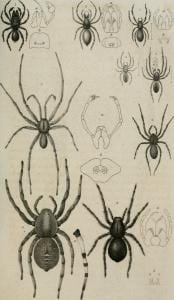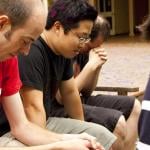
Cure the bite of the “tarantula!”
Disharmony is a bad sign in the soul or the body politic. Visible, superficial disharmony, may point to more serious issues. Just as fever is sometimes a sign of the underlying disease, so disharmony is (usually) not the problem, but a symptom of the problem. Symptoms must be noted as they help diagnose deeper disease. Nobody would want to treat only the symptoms while ignoring the disease, yet too often this is what we do when we self-medicate. Someone may not groan in pain as they slip away, but things are not “better” because things are quieter.
All this reminded me of one of my favorite early definitions of an English word: “tarantula.” According to Samuel Johnson’s great dictionary (1755) a tarantula is an insect whose bite is only cured by musick.* This is not sound medical advice. Do not put on some Simon and Garfunkel to cure your tarantula bite unless you are using it to sooth yourself as someone gets you to medical care. Yet apparently the pretty-great poet Philip Sydney gave this pretty-terrible advice believing it to be true.
Music is soothing and most of us are not going to die from a tarantula bite. Music is good for us mentally and the best music, or at least the right music for us at the moment, can go beyond superficial calm and do some soul work. It will not cure the bite of tarantula, Johnson notwithstanding, but it might help with deeper disharmony or it might be misused to cover a symptom. Bad movie soundtrack music can manipulate our emotions for a moment, “. . .each to his fate”, but great music changes us.
Music and Musick?
“Musick” is just an archaic spelling of “music,” but let’s use “musick” to describe the harmony that touches the deep parts of soul and music to describe more superficial stuff. If we are very depressed, “feel good” music might help a bit, but I often find the “hangover” is worse. If we are deeply sad, then we need musick. We need a great composer, careful musicians, artists that understand and know sorrow like we are having. Just as great books, such as Job or Ecclesiastes, help us because they deal with reality, painful facts, and give hope that is not cheap, so great musick presses home reality, pain, with profound hopefulness. Musick often goes further than the text, because it slips by all our barriers.
A great composer of musick might hearken back to childhood tunes, the musick of our Mothers, and then catch all that up into something for our adult selves. The profundity of the early musick is not lost, but applied to our older selves. Is this what Tchaikovsky did with the sounds of the liturgy? The old is made new without losing the meaning of the old: the jewel given a new setting.
If a hard problem has to be solved in society, then listening to the musick together may help us understand ourselves or each other better. Listening to the musick of someone else, understanding that musick, best we can, might over time be a path to understanding. Musick takes time, often centuries, to develop in a culture. Sometimes a body of work unites many places and times. My grandfather sang some hymns and I can sing them too. Musick unites us. The opposite of this careful, respectful project is grabbing catchy tunes or things we like and superficially appropriating them. “We get it,” we cry, not getting it at all. This haste will only make music, sometimes commercially successful, but rarely enduring, almost never musick. (Miracles do happen.) Music can end up dividing us.
The tarantulas are biting our souls and society. If musick be a cure, play on!
*Johnson gives examples of uses for “tarantula”:
“This world, lover, did not less pierce poor Pyroclcs than the right tune of musick touches him that is sick of the tarantula” (Sidney)
“He that used the word ‘tarantula’ without having an idea of what it stands for, means nothing at all by it.” (Locke)
Musick is (for Johnson) “the science of harmonical sounds.” or “instrumental or vocal harmony.”
















